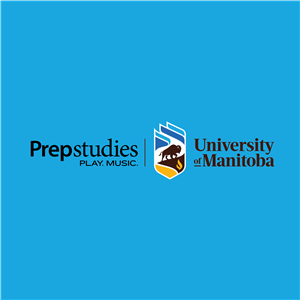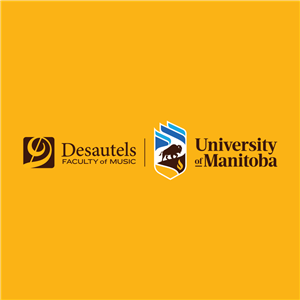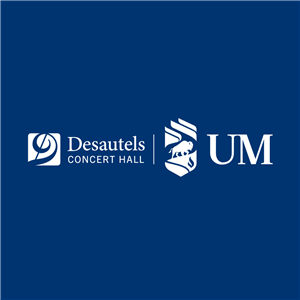Current students
Desautels Faculty of Music Students can find all of the information they need for success in one place.

Desautels Faculty of Music events
All DFOM events can be found on the Desautels Faculty of Music Online Events Calendar
Student advising
Students with questions about academic requirements or progress can meet with an academic advisor.
Request a program progress report
Music student handbooks
Student handbooks provide students with all the music-specific guidelines, deadlines, and requirements for their programs.
University of Manitoba Academic Calendar
The University of Manitoba's Academic Calendar is the official publication containing course descriptions, program and graduation requirements, as well as UM and faculty/school-specific rules, regulations and policies. Students should refer to the Academic Calendar when registering for classes to form a blueprint for year-over-year course planning.
Music courses
All Desautels Faculty of Music courses for the current academic year can be found on Aurora, with the exception of the Micro-Certificate in Songmaking (see below for details). Additional information for the current academic year that is helpful for music students planning their schedules can be found below. If you have any questions or concerns about the information below, please book time with an academic advisor.
Topics courses in 2025-2026
The following Topics courses are being offered this year.
All topics courses are Music Electives. MUSC 3820 courses can be counted as Music OR Music History electives.
MUSC 3820 (T39) - History of Gospel Music
- 3 credit hours
- CRN 65865
- Winter 2026 term
- Tuesday/Thursday 8:30-9:45 am
- Instructor – Dr. Anna Nekola
Gospel music is the music of community, an embodied expression of hope and resilience in the face of injustice and oppression. Although gospel music continues to be tied to faith practices, the sounds of Black gospel are also deeply embedded in the sounds of secular popular music, from Ray Charles and Mahalia Jackson, to Beyonce, Stormzy, and Canadian artist William Prince. The course investigates how musicians make and think about gospel music, and how critics and audiences listen to and think about it, investigating the historical, religious, political, cultural, and social contexts of this music around the world.
Open to Music Students OR with instructor approval for students in other Faculties.
MUSC 3820 (T40) - Hip Hop Studies
- 3 credit hours
- CRN 65880
- Winter 2026 term
- Tuesday/Thursday 1:00-2:15 pm
- Instructor – Melody McKiver
This lecture course is an introduction to the academic area of Hip Hop studies as an African diasporic and global phenomenon, with an emphasis on MCing and DJing as the musical elements of HipHop culture. Themes will range from history and origins of Hip Hop culture, uses of sampling, Black feminist scholarship and Hip Hop feminists, and the widespread global adoption of Hip Hop as a cultural movement with a special resonance to dispossessed and disenfranchised peoples from occupied Turtle Island to Palestine.
Open to all U of M students – no restrictions
MUSC 3830 (T47) - Undergraduate Acting for Singers
- 3 credit hours
- CRN 26478 – Fall 2025 term
- CRN 65962 – Winter 2026 term
- Fall 2025 and Winter 2026 terms spanned
- Monday 2:30-4:00 pm
- Instructor - Katherine Twaddle
The course explores the varying acting styles and techniques required for a career in opera today. Students are given the opportunity to explore different ways to use their body, voice and imagination to create characters and communicate intention, attitude, and story. We look at the various acting styles and theatrical genres used in opera and how and why they have changed throughout history. The importance of observation and reflection is emphasized through class discussion and homework assignments.
Instructor Approval required.
MUSC 3830 (T16) – Role Study
- 3 credits
- Fall 2025 and Winter 2026 terms spanned
- Coaching/masterclass times to be arranged by participants and instructor
- Instructors – Tracy Dahl and Monica Huisman
This course is designed for M. Mus voice students, and with permission by their instructors, for Post-Baccalaureate or undergraduate students. Students will learn how to prepare a full operatic role and apply those skills and techniques to role(s) assigned by the instructors. The student will gain a better understanding of what learning a role means and all the responsibilities associated with a role assignment. The focus will be on the process of learning a full role which involves translations, IPA, character development and style.
This course is designed to be fluid and adaptable both to each student enrolled and to the role’s specific needs. There are no performance expectations in this course, aside from masterclasses or group sessions. The instructor will be expected to coach you through the entire role or roles by the end of the second term.
Instructor approval required.
MUSC 3830 (T32) – Music Production
- 3 credit hours
- CRN 62804
- Winter 2026 term
- Tuesday/Thursday 10:00-11:15am
- Instructor – Melody McKiver
Students will study form and compositional approaches to a variety of musical styles, which may include pop, rock, Hip Hop, and EDM. The course will provide an introduction to the creative use of music technology, including DAW usage and home recording. Assignments will include the development of a musical portfolio, and written reflections and analysis. Students of diverse musical experiences are encouraged to enroll.
Instructor approval required.
MUSC 3830 (T48) - Oratorio Seminar
- 3 credits
- CRN 65963
- Winter 2026 term
- Monday/Wednesday/Friday 1:30-2:20 pm
- Instructor – Mel Braun
Students will perform assigned arias and ensembles from oratorios in this masterclass-format seminar. The class will also work on one or two group projects to include works such as Bach’s Magnificat and Handel’s oratorio Belshazzar. For these projects, the class will divide up the solos, duets, and trios and all sing in the choruses.
Instructor approval required.
MUSC 3830 (T41) – Composition for Film and Media
- 3 credit hours
- CRN 26355
- Fall 2025 term
- Tuesday/Thursday 1:00-2:15pm
- Instructor – Melody McKiver
Students will learn the use of Digital Audio Workstations (DAW) and sample libraries suitable for composition for digital media. Software includes Logic Pro, Ableton Live, and Spitfire LABS. Compositional tools will include MIDI orchestration, sound design, and audio recording. Students will study film history and the use of music as a compliment to storytelling within film, television, and video games. Other topics will include delivery standards and professional practices.
Instructor approval required.
MUSC 3830 (T41) - Introduction to World Drumming
- 3 credit hours
- CRN 65881
- Winter 2026 term
- Tuesday/Thursday 10:00-11:15 am
- Instructors – Fabio Ragnelli and Victoria Sparks
This introductory course explores the rich diversity of global drumming traditions through hands-on experience. Designed to be taught without using traditional western music notation, the course focuses on fundamental rhythm concepts, basic drumming techniques, and group performance practices using percussion instruments from Africa, Latin America, the Middle East, and Asia. Students will develop listening skills and rhythmic coordination. The course will help students to develop an understanding of the social and cultural roles of drumming in various world traditions. No previous music experience is necessary.
Open to all U of M students – no restrictions.
MUSC 3830 (T42) – Business of Music
- 3 credit hours
- CRN 26476
- Fall 2025 term
- Thursday 5:30pm – 8:30pm
- Instructors – TBA
Discover the business side of music. This course will provide a survey of music business topics including artist management, music marketing, rights and royalties, concert promotion, contracts, grants and funding, and financial planning. Students in all genres, including classical, jazz, pop, folk, and more, will learn from experienced industry professionals, gain insight into industry roles, and acquire skills required to succeed in the music business. Prepare for a professional future in music with tools to navigate the sector as a songwriter/composer, performer, arts worker, or industry professional.
Open to all U of M students – no restrictions.
MUSC 3830 (T50)– Intro to Game Audio
- 3 credits
- CRN 26536
- Fall 2025 term
- Thursday 5:30-8:30 pm
- Instructor - TBA
This course introduces students to the foundational principles and practical techniques of game audio design and programming. Emphasis is placed on interactive audio systems using FMOD Studio, a leading middleware audio engine, integrated with Unity or Unreal Engine. Students will explore sound design, audio programming, music systems, and the technical and creative aspects of game audio integration.
Open to all U of M students – no restrictions.
MUSC 3830 (T50) – Intro to Game Audio
3 credits
CRN 66030
Winter 2026 term
Thursday 5:30-8:30 pm
Instructor - TBA
This course introduces students to the foundational principles and practical techniques of game audio design and programming. Emphasis is placed on interactive audio systems using FMOD Studio, a leading middleware audio engine, integrated with Unity or Unreal Engine. Students will explore sound design, audio programming, music systems, and the technical and creative aspects of game audio integration.
Open to all U of M students – no restrictions.
Music student resources
Students can find templates, checklists, and forms for their academic studies
-
Repertoire booklets
Download booklets for classical and composition studies
-
Eckhardt-Gramatté Music Library
The Eckhardt-Gramatté Music Library has many resources to assist students in their studies.
DFOM Recording Crib
The DFOM recording crib houses a select list of recording equipment available to students enrolled in our programs, to ensure they have the tools they need to document performance/practice to evaluate and improve on their skills as a performer, composer, or educator. The cost for one academic year of membership is $50.00 and can be paid in our front office (Tache Hall 319). This membership allows students to sign-out select equipment for free.
Midday performances
Desautels Faculty of Music students can perform for their supportive peers during regularly scheduled middays that occur throughout the academic year. These performances serve as a wonderful way to gain confidence as a performer.
Event promotion
Are you performing in an event outside of DFOM ensembles? Let us help you promote it! Our students, staff, faculty members, and alumni fill the world with music, and we want to help your audience find you!
-

-
If you are giving a performance outside of DFOM ensembles, we can help promote it in our monthly UM Today listing of musical events in which our faculty, staff, students, and alumni are performing.
The UM Today listing will be published and pushed out on our social media channels on the first day of each month.
Submit your event for promotion!
-
If you are a part of a musical group that performs regularly, and would like to submit your group's entire concert season for inclusion in the monthly UM Today listing, please let us know!
The individual concerts in your group's concert season will be published in the UM Today listing for the month in which they occur.
Ensembles


-
Students can browse and download recent ensemble performance photos for their own use. A UM email address is required to access the photos.
University of Manitoba policy notes that photos/videos taken during for-credit courses do not require video/photo consent forms to be signed by students, and this policy applies to ensemble performances. That said, if you do not want to have photos or videos of you taken at ensemble performances, please contact the communications assistant with a photo of yourself (for identification purposes only), and the communications assistant will refrain from taking photos of you at performances. You are not required to provide a reason as to why you do not want to have your photo taken.
Masterclass schedules
Masterclasses are a required part of a music student's degree, offering valuable opportunities to learn, improve, and receive performance feedback. The 2024-2025 masterclass schedules for each instrument type can be found below.
-
Brass masterclasses
- Time: Fridays, 2:30pm-4:30pm
- Location: T2-166
-
Cello masterclasses
- Time: Thursdays, 1:00pm-3:00pm
- Location: Eva Clare Hall (fall term), T450 (winter term)
-
Guitar masterclasses
- Time: Tuesdays, 3:00pm-5:00pm
- Location: T450
-
Jazz masterclasses
- Time: Fridays, 2:30pm-4:30pm
- Location: T2-272
-
Percussion masterclasses
- Time: Fridays, 2:30pm-4:30pm
- Location: T2-145
-
Piano masterclasses
- Time: Fridays, 2:30pm-4:30pm
- Location: Eva Clare Hall (fall term), T250 (winter term)
-
Voice masterclasses
- Time: Thursdays, 3:30pm-5:00pm
- Location: T2-266
-
Violin/Viola masterclasses
- Time: Tuesdays, 1:00pm-3:00pm
- Location: Eva Clare Hall (fall term), T250 (winter term)
-
Woodwinds masterclasses
- Time: Fridays, 2:30pm-4:00pm
- Location: T2-162
Ensemble auditions
Students are required to participate in two ensembles per academic year. Ensemble auditions occur at the beginning of fall term
Get involved
-

-
FMSA Council
The Desautels Faculty of Music Students’ Association (FMSA) Council works to build a professional and supportive community within the faculty and advocates on behalf of students. They host and are involved in activities throughout the year.




